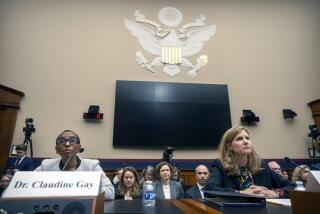<i> Negative Stereotyping Distorts Arabs’ Image
- Share via
Caring Americans wring their hands over stereotypes in the U.S. that haunt blacks, Latinos, Asians, Italians, Native Americans, Catholics, Jews, gays and (you fill in the blank). Just as nasty, though, is the stigma that usually goes unmentioned.
An estimated 3.5 million Arab Americans live in the U.S. What would you say, about 3 million are terrorists? Well, half anyway.
Why wouldn’t you think that?
Why wouldn’t it be in the minds of knee-jerk TV newscasters who reported immediately after the 1995 Oklahoma City bombing that the FBI was seeking three males, two of them “Middle Eastern with dark hair and beards”?
Why wouldn’t the security officers who ejected Abdullah Al-Arian from the White House annex think it too? Al-Arian is the Duke University student and congressional intern who was there for a meeting with Muslim leaders on President Bush’s faith-based initiative last month when he was removed after a false tip that he was linked to terrorists.
You know, the shadowy guys we see again and again in movies and on TV. Because there are no other Arabs, right? Except, that is, for harem girls and bearded, limousined, oil-rich sheiks in dark glasses, wielding their billions like spiked clubs.
With violent conflict between Israelis and Palestinians again raging in the Middle East, their media images assume even greater weight and loom especially large. It’s hard telling which side is winning the crucial public relations duel in the news, as bitter charges fly back and forth between these Jews and Arabs, each blaming the other for fomenting violence in the most recent intifada, estimated to have killed more than 600 in the last 10 months, mostly Palestinians.
As for PR points in opinion-shaping TV shows and feature films, though, Arabs still are nearly shut out.
“There’s an unending barrage of the same hate-filled images portraying Arabs as less than human,” said scholar Jack G. Shaheen, whose excellent new book, “Reel Bad Arabs,” is a valuable, detailed, fast-reading compendium of theatrical movies that follows his incisive earlier work, “The TV Arab.” “Not only are they bashed and vilified on a constant basis,” Shaheen added from his home in South Carolina, “the religion [Islam] is thrown in too.”
Shaheen mentions a minority of feature films he feels contain positive portraits of Arabs. And on TV? “Zilch, nunca, nada, zero,” he said. “You never see Arab families. You never see people who look like and act and behave like other people.”
One very, very rare exception is “The Kitchen,” Andre Degas’ aching small film about conflict between an assimilated young Egyptian American and his Old World-ish father who wants his musician son to one day take over his small grocery store in the Hell’s Kitchen section of New York. The Independent Television Service production, which was shown on Father’s Day on many PBS stations and Sunday on KCET, uses its Arab characters to explore universal family themes.
More typical is the pilot for a new CBS fall series, “The Agency.” It opens with a CIA agent giving a briefing on terrorists “sworn to wage holy war” against the U.S. and its friends. The rest of the story has the CIA scrambling to block a bombing planned by these foreign Arabs and learning that they control even a non-terrorist Arab diplomat posted in Washington.
Coming to CBS as well is “The President’s Man: Ground Zero,” with Chuck Norris reprising his role as a secret White House operative, this time aiming to stop “an Islamic terrorist,” in the network’s words, from taking out a major U.S. city with a nuclear device.
Why is “Islamic” relevant to his terrorism? Using it in this context ignores the enormous diversity of this religion, whose followers number more than 1 billion globally, the overwhelming bulk of whom are not fatalistic zealots or suicide bombers.
CBS agreed to drop “Holy War” from the original title, “The President’s Man: Holy War,” after a meeting with activists, said Salam Al-Marayati, executive director of the Muslim Public Affairs Council in Los Angeles.
The network also promised to add an Arab American attorney general character to the movie and drop all references to religion but one reference to “Allah” (Arabic for God), Al-Marayati said.
A CBS spokeswoman confirmed the new title and the attorney general figure and said all “Allah” references were out.
She denied that the network had promised the activists anything specific, however, and added that script changes were underway even before the meeting with Al-Marayati and his group.
Latino drug lords are always an option as heavies.
With no more Soviets for U.S. heroes to fight on TV, thanks to the Cold War’s ending, however, Arabs have become the clay pigeon of choice.
CBS is hardly the only TV culprit here. Almost from its inception, the medium has been an equal-opportunity stereotyper, distorting or exaggerating the images of just about everything and everyone from gender types to ethnic and racial minorities. After all, it’s much easier to reach for a cliche in a card file than dig for creativity.
The difference is that ugly smearing of other minorities is increasingly balanced, at least somewhat, by positive portrayals, the result of intense lobbying by advocacy groups. Not so Hollywood’s evil Arabs.
“Whenever they can, they blow off Muslim concerns,” said Ibrahim Hooper, spokesman for the Washington-based Council on American-Islamic Relations. “If they [portrayals] were neutral even 20% or 30% of the time, it might not be so upsetting.
But Muslims and Arabs seem to be the only people stereotyped 100% of the time. People point to the negative portrayals of Italians in ‘The Sopranos’ [HBO’s series about Mafiosi in New Jersey], but there are 20,000 positive ones elsewhere.”
It’s time to note that the 1993 World Trade Center bombing was no dream and that Arab terrorists are no fantasy. History and news headlines tell us they are every bit as real and scary as Italian mobsters. The issue is balance.
Arabs are depicted as disgusting or they’re invisible.
“I’m not saying an Arab should never be portrayed as a villain,” Shaheen writes. “What I’m saying is that almost all Hollywood depictions of Arabs are bad ones. This is a grave injustice [because] repetitious and negative images of the reel Arab literally sustain adverse portraits across generations.”
Many of the feature movies mentioned in “Reel Bad Arabs” get extended exposure, Shaheen notes, when “repeatedly broadcast on cable television and beamed directly into the home.” And the proliferation of “billionaires, bombers and belly dancers” that he cited in earlier TV shows resurface evermore in syndicated reruns shoveled into that deepening infinity known as cable.
Still true is what Shaheen wrote in his earlier book: “The present Arab stereotype parallels the image of Jews in pre-Nazi Germany, where Jews were painted as dark, shifty-eyed, venal and threateningly different people.”
Americans should wage war against that. But not holy war.
*
Howard Rosenberg’s column appears Mondays and Fridays. He can be contacted by email at howard.rosenberg@latimes.com.
More to Read
Sign up for Essential California
The most important California stories and recommendations in your inbox every morning.
You may occasionally receive promotional content from the Los Angeles Times.













